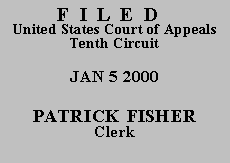 UNITED STATES COURT OF APPEALS
UNITED STATES COURT OF APPEALS
 UNITED STATES COURT OF APPEALS
UNITED STATES COURT OF APPEALS
TENTH CIRCUIT
| MARCUS DEJUAN CRAIN, | |
| v. | No. 99-6228 |
| H.N. SCOTT; ATTORNEY GENERAL OF THE STATE OF OKLAHOMA, | (D.C. No. 97-CV-413) |
ORDER AND JUDGMENT(*)
Before SEYMOUR, Chief Judge, BALDOCK, and HENRY, Circuit Judges.(**)
In June 1994, Petitioner Marcus Dejuan Crain pled guilty in Oklahoma state court to conspiracy to commit a felony, concealing stolen property, and twelve counts of first degree robbery, after former conviction of two or more felonies. The trial court sentenced Petitioner to 30 years imprisonment on each of the first degree robbery convictions and 25 years imprisonment on each of the remaining counts, with all sentences to be served concurrently, but consecutive to sentences Petitioner received in other cases for three counts of concealing stolen property and three counts of making a false declaration to a pawnbroker, all after former conviction of a felony. Petitioner did not move to withdraw his guilty pleas and did not perfect a direct criminal appeal. Instead, he unsuccessfully sought post-conviction relief in state court. Thereafter, Petitioner filed a petition for a writ of habeas corpus under 28 U.S.C. § 2254 in federal district court raising five claims: (1) insufficient evidence supported his conviction for first degree robbery; (2) insufficient evidence supported his conviction for conspiracy to commit a felony; (3) the trial court erred by failing to require full disclosure of the plea agreement and by misadvising him about the consequences of such plea agreements; (4) the trial court erred by failing to establish a factual basis for the guilty pleas entered on the robbery charges; and (5) trial counsel was ineffective for allowing Petitioner to enter guilty pleas to charges he "knew nothing about" and "did not commit," and for failing to file a pretrial motion to quash the information.
In a thorough report and recommendation, a magistrate judge recommended denial of the petition. The magistrate judge concluded that Petitioner's first four claims were procedurally barred and that Petitioner failed to demonstrate cause and prejudice or a fundamental miscarriage of justice. See Coleman v. Thompson, 501 U.S. 722, 750 (1991) ("In all cases in which a state prisoner has defaulted his federal claims in state court pursuant to an independent and adequate state procedural rule, federal habeas review of the claims is barred unless the prisoner can demonstrate cause for the default and actual prejudice as a result of the alleged violation of federal law, or demonstrate that failure to consider the claims will result in a fundamental miscarriage of justice."). The magistrate judge further concluded that Petitioner's ineffective assistance of counsel claim lacked merit. The district court subsequently adopted the report and recommendation and denied Petitioner a certificate of appealability. See 28 U.S.C. § 2253(c). His renewed application is before us.
A petitioner may appeal the denial of a § 2254 petition only if "a circuit justice or judge" issues a certificate of appealability. 28 U.S.C. § 2253(c)(1)(A). A certificate of appealability "may issue . . . only if the applicant has made a substantial showing of the denial of a constitutional right." Id. at § 2253(c)(2). We conclude that Petitioner has failed to make the required showing.
We have thoroughly reviewed Petitioner's application for a certificate of appealability, his brief, the magistrate judge's report and recommendation, the district court's order adopting that report and recommendation, and the entire record before us. We conclude that Petitioner has failed to make a substantial showing of the denial of a constitutional right substantially for the reasons set forth in the magistrate judge's report and recommendation. Accordingly, we deny his request for a certificate of appealability and dismiss the appeal.
CERTIFICATE OF APPEALABILITY DENIED; APPEAL DISMISSED.
Entered for the Court,
Bobby R. Baldock
Circuit Judge
*. This order and judgment is not binding precedent, except under the doctrines of law of the case, res judicata, and collateral estoppel. The court generally disfavors the citation of orders and judgments; nevertheless, an order and judgment may be cited under the terms and conditions of 10th Cir. R. 36.3.
**. After examining the briefs and appellate record, this panel has determined unanimously that oral argument would not materially assist in the determination of this appeal. See Fed. R. App. P. 34(a)(2)(c); 10th Cir. R. 34.1(G). The case is therefore ordered submitted without oral argument.